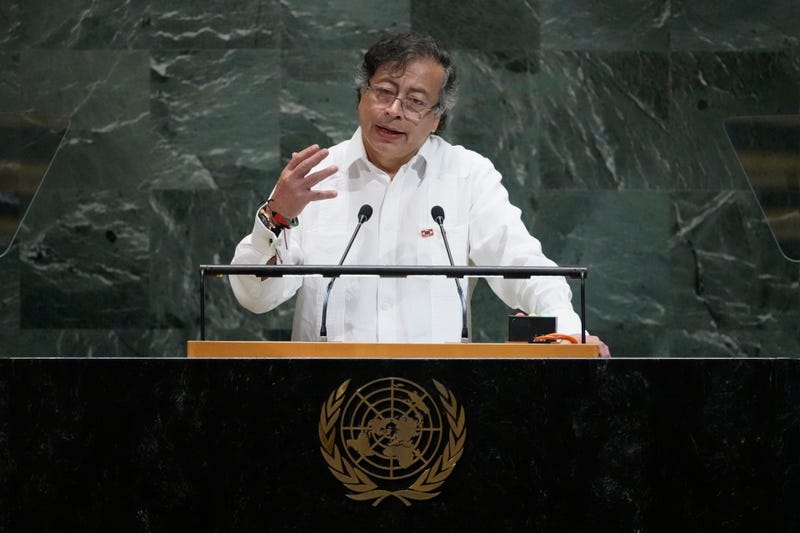
BOGOTA, Colombia (AP) — Colombia's foreign minister has “renounced” her U.S. visa to protest a decision by the U.S. State Department to revoke the visa of Colombian President Gustavo Petro, the Colombian government said Monday.
The decision by Foreign Minister Rosa Villavicencio comes as tensions between both nations escalate over issues that include drug policy, the war in Gaza and a U.S. naval build up in neighboring Venezuela.
Colombia's Foreign Affairs Ministry did not respond to questions about what kind of visa Villavicencio held, but said in a statement that it was not interested in “diplomatic visas that limit opinions" or curtail the nation's "sovereignty.”
Later on Monday, Colombian Finance Minister Germán Ávila wrote in an X message that he would stop using his visa in “solidarity” with Petro, and because of the “aggression” he was subjected to by the United States. “To work for our people, we do not need visas” Ávila wrote.
The U.S. State Department revoked Petro’s visa Friday after he participated in a protest in New York against the war in Gaza, in which Petro called for the creation of an international army to liberate the West Bank and the Gaza Strip.
Holding a megaphone and wearing a kaffiyeh, the traditional Palestinian scarf, Petro called on U.S. soldiers to “disobey” President Donald Trump’s orders, adding that they should “not point their rifles against humanity."
Hours after the protest, the State Department said on social media that it would cancel Petro’s visa “due to his reckless and incendiary actions.”
Petro was back in Colombia when the visa announcement was made, after having spent several days in New York attending the U.N. General Assembly. He wrote on X that he “didn’t care” about the punishment because he is also an Italian citizen, and could possibly travel to the U.S without a visa.
The revocation of Petro’s visa marks a new low in the leftist leader’s relations with the Trump administration, which earlier this month placed Colombia on a list of countries that it says are not fulfilling their international commitments to curb drug trafficking.
Geoff Ramsey, a Colombia analyst at the Atlantic Council, said the foreign minister's decision to ban herself from visiting the United States places more obstacles in the relationship. He said it also reflects an effort by the Petro administration to distance itself from the U.S. government, as Colombia heads into congressional and presidential elections next year.
“Petro is not even remotely interested in repairing the relationship with Washington,” Ramsey said. “He’s clearly betting that confrontation with Trump will score points for his coalition in the upcoming election cycle, and is willing to torch the bilateral relationship with the United States in the process.”
David Hart, an immigration attorney based in Miami, said it is very rare for non-immigrant visa holders — such as those with tourist or diplomatic visas — to renounce their travel permit.
He said that people who do not want to travel to the U.S. can simply let their visas expire and then choose to not renew them.
“They are doing this for the media and to show solidarity” with Petro, Hart said of the foreign minister’s efforts to renounce her visa.
Wilfredo Allen, an immigration attorney from Miami, said that there is no formal procedure for quitting on a non-immigrant visa. He added that Colombia’s foreign affairs minister will likely have to send a letter to the U.S. Embassy seeking the cancellation of her travel permit.
“If you don’t want to travel to the U.S. you can simply choose not to come,” Allen said. “I had never seen someone take the time to renounce a non-immigrant visa.”
___
Follow AP’s coverage of Latin America and the Caribbean at https://apnews.com/hub/latin-america